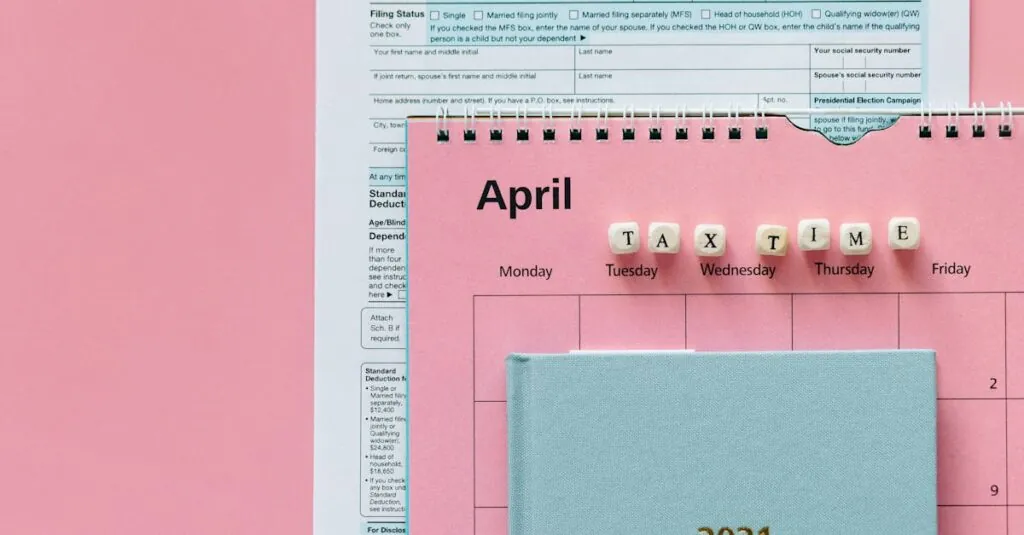Every year, there comes a time when wallets feel a little lighter and bank statements spark a bit more anxiety. Welcome to Financial Reset Month, the annual reminder that it’s time to shake off the financial cobwebs and regain control of those pesky dollars. Think of it as spring cleaning for your finances—minus the dust bunnies and with a lot more spreadsheets.
This month isn’t just about crunching numbers; it’s about unleashing the financial superhero within. Whether it’s tackling debt, budgeting like a boss, or finally understanding what a 401(k) actually is, it’s time to transform financial chaos into clarity. So grab your favorite beverage and get ready to dive into the world of money management, where every little change can lead to big rewards.
Table of Contents
ToggleWhat Is Financial Reset Month?
Financial Reset Month dedicates time to reassessing and improving personal finances. This initiative allows individuals to focus on budgeting and effective money management.
Definition and Origin
Financial Reset Month originated from the need to declutter financial habits, similar to spring cleaning. It emphasizes reviewing expenses and creating financial goals. People initiated this concept to encourage better financial practices. Monthly observances aim to inspire individuals to prioritize their economic well-being. January is often selected, aligning with New Year’s resolutions and fresh starts.
Significance in Personal Finance
The significance lies in its potential to transform financial perspectives. This month promotes targeted actions like debt reduction and enhanced budgeting plans. Individuals often find that awareness of their financial situation leads to informed decisions. Recognizing investment options such as retirement accounts also empowers better planning. Small adjustments made during this month can yield long-term benefits, fostering financial stability and confidence.
Benefits of Participating in Financial Reset Month
Financial Reset Month offers several advantages for individuals eager to enhance their financial standing. By focusing on specific actions, participants can cultivate a healthier financial future.
Improved Financial Awareness
Enhanced awareness of personal finances emerges as a significant benefit. Individuals often gain clarity about spending habits and financial obligations during this time. Through careful review, they identify unnecessary expenses and prioritize essential ones. Tracking expenditures helps individuals uncover patterns that require adjustment. Increased awareness leads to informed decisions about where to allocate funds. Understanding one’s financial position empowers individuals to take deliberate steps toward improvement.
Goal Setting and Planning
Establishing clear financial goals stands out as another key benefit. Setting precise, achievable objectives provides individuals with direction. Participants often outline short-term and long-term financial aspirations, creating structured plans to realize them. These goals might encompass debt repayment, emergency savings enhancements, or retirement planning. Formulating actionable strategies motivates individuals to remain focused and accountable. Regularly revisiting and adjusting goals ensures that they align with evolving financial circumstances.
How to Prepare for Financial Reset Month
Preparing for Financial Reset Month involves a few key steps that set a solid foundation for financial improvement.
Assessing Your Current Financial Situation
Begin by gathering recent financial statements, including bank account balances and credit card statements. This helps pinpoint current income and monthly expenses. Identifying recurring costs aids in recognizing unnecessary expenditures. Take time to understand various debts and their associated interest rates. Reviewing these details provides clarity about financial obligations. Individuals can benefit from creating a net worth statement, which summarizes assets against liabilities. This overview makes it easier to track progress throughout the month. Clarifying one’s financial position sets the stage for more effective planning.
Creating a Budget Plan
Start by categorizing expenses into fixed and variable groups. Fixed costs include rent and utilities, while variable expenses encompass groceries and entertainment. Establishing spending limits within each category promotes responsible financial habits. Use the insights gained from assessing the current financial situation to inform these limits. Individuals can also consider implementing the 50/30/20 rule for balanced budgeting. Allocating 50% to needs, 30% to wants, and 20% to savings or debt repayment ensures comprehensive coverage of financial goals. Regularly revising the budget plan keeps it aligned with changing circumstances and supports ongoing financial health.
Strategies for a Successful Financial Reset Month
Financial Reset Month provides a perfect opportunity to enhance personal finance management. Engaging in actionable strategies can lead to lasting improvements.
Cutting Unnecessary Expenses
Identifying unnecessary expenses is crucial for effective financial management. Begin by reviewing monthly statements to pinpoint recurring charges. Eliminating subscription services no longer used can immediately free up funds. Comparing prices for services like insurance and utilities often reveals potential savings. Dining out less frequently creates significant savings over time. Opting for home-cooked meals not only cuts costs but also promotes healthier eating habits. Lastly, prioritizing essential expenses ensures that individuals allocate resources effectively.
Setting Realistic Financial Goals
Establishing realistic financial goals drives progress and motivation. Use the SMART criteria, focusing on specific, measurable, achievable, relevant, and time-bound objectives. For example, aiming to save a specific amount for an emergency fund within six months can create a clear target. Break larger goals into manageable steps to monitor progress easily. Regularly revisiting these goals allows for adjustments based on changing financial circumstances. Involving family members or accountability partners can enhance commitment. Celebrate achievements, no matter how small, to maintain motivation throughout the financial reset journey.
Financial Reset Month offers a valuable opportunity for individuals to take charge of their financial futures. By reassessing spending habits and setting clear goals, participants can foster healthier financial practices that lead to long-term stability. Engaging in this month-long initiative encourages a proactive approach to budgeting and debt management.
As individuals embrace the principles of Financial Reset Month, they can transform their financial outlook and cultivate a sense of empowerment. The small changes made during this time can have a lasting impact, motivating ongoing financial awareness and informed decision-making. Ultimately, committing to this reset not only enhances financial well-being but also paves the way for a brighter economic future.













